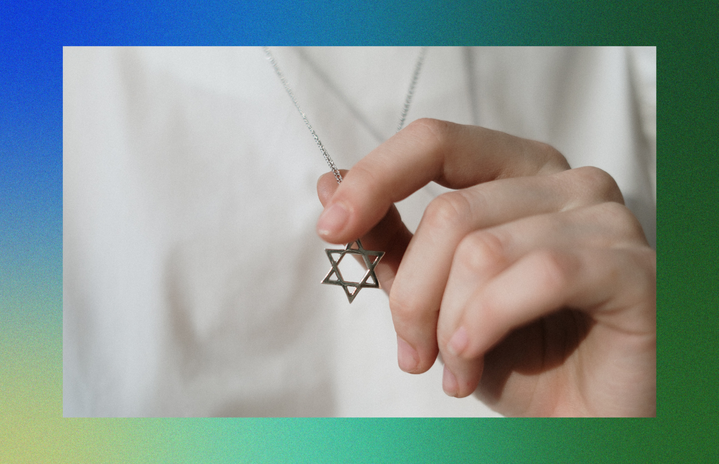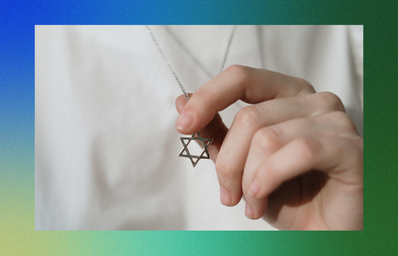Kanye West is no stranger to controversy. In an Oct. 6 interview with Fox News’ Tucker Carlson, West spoke all about his anti-choice beliefs and the “White Lives Matter” shirts he created that had social media up in arms. And over the past few weeks, West also made anti-Semitic remarks on social media and in interviews.
In that same Fox News interview, West argued that Jewish people have too much power. In an Oct. 16 interview with Drink Champs, West said he believes Jewish people are “[owning] the Black voice,” and on Oct. 8, he tweeted his wish to go “death con 3 on JEWISH PEOPLE.” (His Twitter and Instagram accounts have since been banned.) Also, in reference to his collaboration with Adidas, West asserted in his Drink Champs interview that he “can say anti-Semitic things and Adidas can’t drop [him].” On Oct. 19, when asked by Piers Morgan if he was remorseful for his tweet about going “death con 3” on Jewish people, West simply said, “Absolutely not.” Her Campus reached out to West’s team for comment but did not hear back by the time of publication.
You may think this issue of anti-Semitism lies with West only, but because of his audience and influence, these comments have led to further anti-Semitic protests and sentiments. For example, on Oct. 22 in Los Angeles, a white supremacist group hung a banner reading, “Honk if you know,” with another one reading, “Kanye is right about the Jews” over a major highway. And despite that companies are finally taking action against West, Gen Z remains relatively unbothered by his anti-Semitism, and he remains one of the most listened-to artists in the world.
But this isn’t just about West — this instance of anti-Semitism is a reflection of a greater trend. Over the past few years, anti-Semitism has sharply risen. Specifically, in the US, instances of anti-Semitism reached an all-time high in 2021, according to the Anti-Defamation League, and in Canada, anti-Jewish hate crimes rose almost 60% from 2019 to 2021, with Judaism being the No. 1 most targeted faith. However, despite the increasing prejudice and hate Jewish people are facing, influencers, celebrities, and citizens have rarely spoken up. The only people who seem to be posting about this issue online or talking about it in person are Jewish people — otherwise, no one seems to know or care.
West’s comments and the following protests are a clear act of hate, so why are so few young people talking about it on social media, or on my college campus? What is it about anti-Semitism that leads people to turn their heads the other way?
The only people who seem to be posting about this issue online or talking about it in person are Jewish people — otherwise, no one seems to know or care.
The silence for anti-Jewish hate crimes is especially evident today, but it’s nothing new. In the many anti-Semitic events that have occurred in my life, I’ve been forced to stand alone. In fact, my most significant experience with anti-Semitism — and perhaps the most isolating experience of my life — was four years ago. I was a junior when my Anglican high school performed an extremely anti-Semitic play, which included false representations of the Holocaust, exaggerated and humourized Jewish stereotypes, and audience participation in chanting hateful phrases. This led me to feel isolated from my friends and peers, who told me I was overreacting — even when the school finally took action to remedy the issue after making national news.
Then, when I was a senior in high school, a flood of fake news and anti-Semitic posts spread around social media, leading me to delete Instagram over the overwhelming lack of empathy I saw. In college, the synagogue bombings and growing instances of Holocaust denying were met with silence throughout my social groups. Last year, I spoke up alone when I learned about a school building being named after an extremely anti-Semitic leader, only for no action to be taken.
And now, after West’s comments, I’m seeing the same pattern of silence. The same people who constantly post about social justice issues when major events arise are remaining quiet, only proceeding with their regularly-scheduled aesthetic fall pictures, concert videos, and vacation posts. Throughout my life, I’ve stood up for myself amidst the silence, hoping my non-Jewish friends and peers would support me. I hoped they’d acknowledge how I’m feeling, and stand up against prejudice. But few have, and I’ve mostly been met with silence.
It’s sad enough that anti-Semitic events are so common — but the fact that so few seem to care amplifies the problem. Social change isn’t possible if the only people standing up for equality are the victims. I’ve seen this many times with my own eyes. As illustrated in the poem “First they came for…” by German Lutherian pastor Martin Niemöller after witnessing the horrors of the Holocaust, people only seem to care when an issue personally affects them — and anti-Semitism is no exception.
I’m sick of being told I’m overreacting from someone who couldn’t possibly know what this type of attack feels like.
But the truth is, it’s disheartening to feel like I’m standing alone against hate. It’s painful to feel unsurprised when so few of my non-Jewish friends even know what’s going on. I’m sick of being told I’m overreacting from someone who couldn’t possibly know what this type of attack feels like. And I’m tired of seeing these same issues worsen despite the constant fight against anti-Semitism from Jewish people around the world.
In a lot of ways, this Kanye West issue is no different from the many other instances of hate we see in our world today — it just affects a different minority. So despite any previous assumptions or stereotypes that may be lessening your willingness to advocate aganist anti-Semitism, I urge you to stand with your Jewish friends, neighbours, and fellow citizens against all forms of hate. Bring up the issue in conversation. Read articles just like this one. Inform yourself and others. Talk to your Jewish friends about how this affects them. Share informative posts on social media. The more we talk, the more we teach others about the severity of anti-Semitism, and hopefully start moving in the right direction. If we remain silent, anti-Semitism has room to grow — and Jewish people everywhere continue feeling isolated and victimized.


